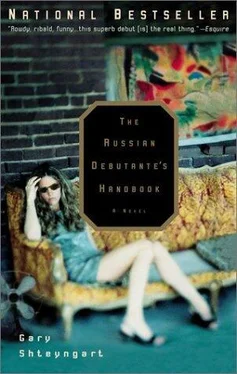Gary Shteyngart - The Russian Debutante's Handbook
Здесь есть возможность читать онлайн «Gary Shteyngart - The Russian Debutante's Handbook» весь текст электронной книги совершенно бесплатно (целиком полную версию без сокращений). В некоторых случаях можно слушать аудио, скачать через торрент в формате fb2 и присутствует краткое содержание. Город: New York, Год выпуска: 2003, ISBN: 2003, Издательство: Riverhead Books, Жанр: Современная проза, Юмористическая проза, на английском языке. Описание произведения, (предисловие) а так же отзывы посетителей доступны на портале библиотеки ЛибКат.
- Название:The Russian Debutante's Handbook
- Автор:
- Издательство:Riverhead Books
- Жанр:
- Год:2003
- Город:New York
- ISBN:0-7865-4177-6
- Рейтинг книги:4 / 5. Голосов: 1
-
Избранное:Добавить в избранное
- Отзывы:
-
Ваша оценка:
- 80
- 1
- 2
- 3
- 4
- 5
The Russian Debutante's Handbook: краткое содержание, описание и аннотация
Предлагаем к чтению аннотацию, описание, краткое содержание или предисловие (зависит от того, что написал сам автор книги «The Russian Debutante's Handbook»). Если вы не нашли необходимую информацию о книге — напишите в комментариях, мы постараемся отыскать её.
and
. The Russian Debutante’s Handbook Bursting with wit, humor, and rare insight,
is both a highly imaginative romp and a serious exploration of what it means to be an immigrant in America.
The Russian Debutante's Handbook — читать онлайн бесплатно полную книгу (весь текст) целиком
Ниже представлен текст книги, разбитый по страницам. Система сохранения места последней прочитанной страницы, позволяет с удобством читать онлайн бесплатно книгу «The Russian Debutante's Handbook», без необходимости каждый раз заново искать на чём Вы остановились. Поставьте закладку, и сможете в любой момент перейти на страницу, на которой закончили чтение.
Интервал:
Закладка:
“So, what’s your name? We’ll start with that.”
“Rybakov,” said the Fan Man. “Aleksander. Or just Aleks.”
“Please… Tell me about yourself. If you’re comfortable—”
“I’m psychotic,” Rybakov said. His enormous eyebrows twitched in confirmation, and he smiled with false modesty, like a kid who brings in his father the astronaut on career day.
“Psychotic!” Vladimir said. He tried to look encouraging. It was not uncommon for the mad Russians to give him their diagnosis right off the bat; some treated it almost like a profession or a calling in life. “And you’ve been diagnosed?”
“By many people. I’m under observation as we speak,” said Mr. Rybakov, peering under Vladimir’s desk. “Look, I even wrote a letter to the president in the New York Times. ”
He produced a crumpled piece of paper reeking of alcohol, tea, and his own wet palm. “Dear Mr. President,” read Vladimir. “I am a retired Russian sailor, a proud combatant against the Nazi terror in the Second World War and a diagnosed paranoid schizophrenic. I have lived in your wonderful country for more than five years and have received much moral and financial support from the warm and highly sexed American people (in particular, my thoughts alight on the women skating around Central Park with just a bit of cloth wrapped around their breasts). Back in Russia, senior citizens with mental disabilities are kept in dilapidated hospitals and humiliated on a daily basis by young hooligans who have scarcely heard of the Great Patriotic War and have no sympathy for their elders who fought tooth and nail to keep out the murderous Krauts. In America, I am able to lead a full, satisfactory life. I select and purchase groceries at the Sloan’s supermarket on Eighty-ninth Street and Lexington. I watch television, specifically the show about the comical black midget on channel five. And I help defend America by investing part of my social security income into companies such as Martin Marietta and United Technologies. Soon I will become a citizen of this great nation and will be able to choose my leaders (not like in Russia). So I wish you, Mr. President, and your desirable American wife and developing young daughter, a very healthy, happy New Year. Respectfully, Aleksander Rybakov.”
“Your English is impeccable.”
“Oh, I can’t take credit for that,” the Fan Man said. “That was Miss Harosset’s translation. She was faithful to the original, you can believe me. She wanted to put ‘German’ instead of ‘Kraut,’ but I insisted. You have to write what you feel inside, I told her.”
“And the New York Times actually published this letter?” Vladimir asked.
“Those cretinous editors crossed out half my words,” Mr. Rybakov said, shaking a symbolic pen at Vladimir. “It’s American censorship, my friend. You don’t blot out the words of a poet! Well, I’ve instructed Miss Harosset to commence a lawsuit on this matter as well. Her little sister is thrashing around with an important state prosecutor, so I think we’re in good hands.”
Miss Harosset. That must be his social worker. Vladimir looked down at the blank form on which he should have been jotting down information. A rich and particular psychosis was taking shape before him, threatening to upset the meager line allotted for “client’s mental state.” He grew restless, attributing it to the coffee settling within his abdomen, and started tapping out “The Internationale” on his metal desk, a nervous habit inherited from his father. Outside the nonexistent windows of the back office, the canyons of the financial district were awash with rationalism and dull commercial hope: suburban secretaries explored bargains on cosmetics and hose; Ivy Leaguers swallowed entire pieces of yellowtail in one satisfied gulp. But here it was just Vladimir the twenty-five-year-old and the poor huddled masses yearning to breathe free. Vladimir looked up from his thoughts—his client was wheezing and sputtering like an overtaxed radiator. “Look, Rybakov,” he said. “You are a model immigrant. You collect Social Security. You publish in the Times. What can I possibly do for you?”
“The crooks!” Rybakov shouted, grabbing once again for his crutch. “The awful crooks! They won’t give me my citizenship! They’ve read the letter in the Times. And they know about the fan. They know about both fans. You know how some summer nights the blades get a little rusty and you have to grease them with corn oil? So they’ve heard the trikka trikka and the krik krak, and they’re scared! An old invalid, they’re scared of! There are cowards in every country, even in New York.”
“That’s true enough,” Vladimir agreed. “But I think what you need, Mr. Rybakov, is an immigration lawyer… For unfortunately, I am not…”
“Oh, I know who you are, little goose,” Mr. Rybakov said.
“Pardon?” Vladimir said. The last time he had been called “little goose” was twenty years ago, when he was, indeed, a diminutive, unsteady creature, his head covered with a smattering of golden down.
“The Fan sang an epic song for me the other night,” said Rybakov. “It was called ‘The Tale of Vladimir Girshkin and Yelena Petrovna, His Mama.’”
“Mother,” Vladimir whispered. He didn’t know what else to say. That word, when spoken in the company of Russian men, was sacred in itself. “You know my mother?”
“We haven’t had the pleasure of being formally introduced,” Rybakov said. “But I read about her in the business section of the New Russian Word. What a Jewess! The pride of your people. A capitalist she-wolf. Scourge of the hedge funds. Ruthless czarina. Oh, my dear, dear Yelena Petrovna. And here I am chatting with her son! Surely he knows the right people, fellow Hebrews perhaps, among the dastardly agents of the Immigration and Naturalization Service.”
Vladimir scrunched up his hairy upper lip so as to smell its animal fragrance—a soothing pastime. “But you’re mistaken,” he said. “There is nothing I can do for you. I lack Mother’s cunning, I have no friends in the INS… I have no friends anywhere. The apple has fallen far from the apple tree, as they say. Mother may be a she-wolf, but look at me…” Vladimir gestured expansively at the deprivation around him.
Just then the double doors opened, and, twenty minutes late for work, the Chinese and Haitian women—Vladimir’s fellow junior clerks in the back office—walked in from the streets, laden with buttered rolls and coffee. They retreated behind the desks labeled CHINA and HAITI, tucking in their long, gauzy summer skirts. When Vladimir’s gaze returned to his client, ten hundred-dollar bills, ten portraits of purse-lipped Benjamin Franklin, were unfurled on the table to form a paper fan.
“Ai!” Vladimir cried. Instinctively, he grabbed the hard currency and deposited it inside his shirt pocket. He glanced at his international colleagues. Oblivious of the crime just committed, they were stuffing themselves with morning rolls, bantering about recipes for Haitian crackers and how to know if a man was decent. “Mr. Rybakov!” Vladimir whispered. “What are you doing? You cannot give me money. This is not Russia!”
“Everywhere is Russia,” said Mr. Rybakov philosophically. “Everywhere you go… Russia.”
“Now I want you to place your upturned palm on the table,” Vladimir instructed. “I will quickly throw the money in there, you put the money in your wallet, and we shall consider this matter closed.”
“I would prefer not to,” said Aleksander Rybakov, the Soviet Bartleby. “Look,” he said. “Here’s what we’ll do. Come on over to my house. We’ll talk. The Fan likes his tea early on Mondays. Oh, and we’ll have Jack Daniel’s, and beluga, and luscious sturgeon, too. I live on Eighty-seventh Street, right next to the Guggenheim Museum, that eyesore. But it’s a nice penthouse, views of the park, a Sub-Zero refrigerator… A lot more civilized than this place, you’ll see… Forget about your duties here. Helping Equadorians move to America, it’s a pointless task. Come, let’s be friends!”
Читать дальшеИнтервал:
Закладка:
Похожие книги на «The Russian Debutante's Handbook»
Представляем Вашему вниманию похожие книги на «The Russian Debutante's Handbook» списком для выбора. Мы отобрали схожую по названию и смыслу литературу в надежде предоставить читателям больше вариантов отыскать новые, интересные, ещё непрочитанные произведения.
Обсуждение, отзывы о книге «The Russian Debutante's Handbook» и просто собственные мнения читателей. Оставьте ваши комментарии, напишите, что Вы думаете о произведении, его смысле или главных героях. Укажите что конкретно понравилось, а что нет, и почему Вы так считаете.












